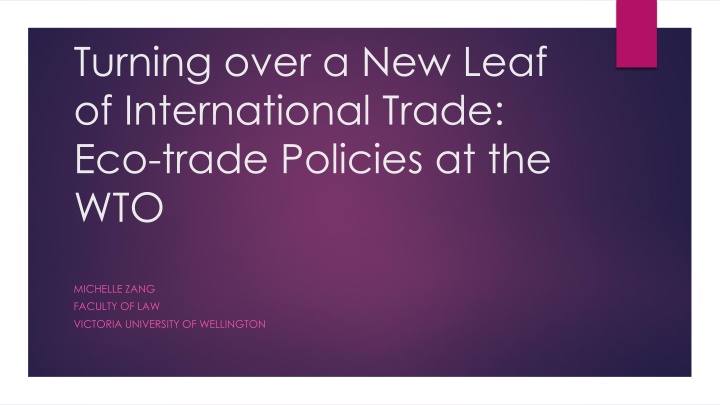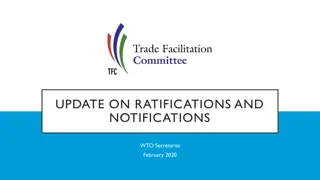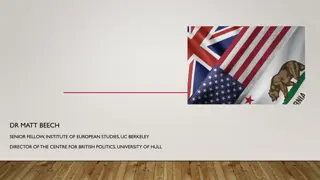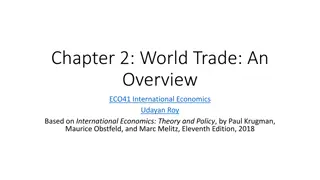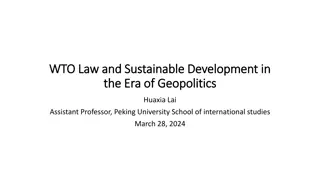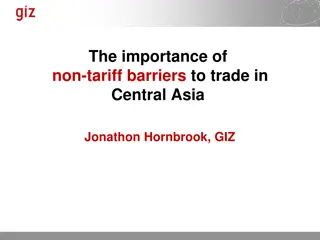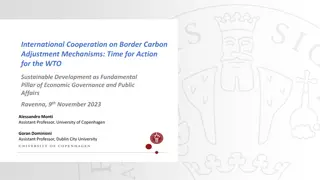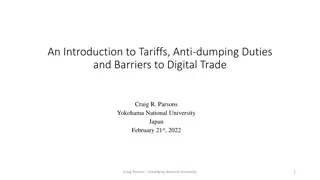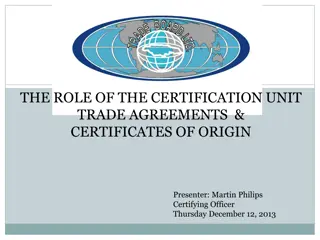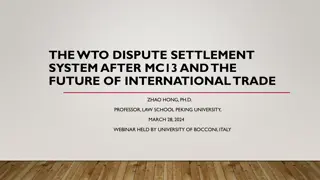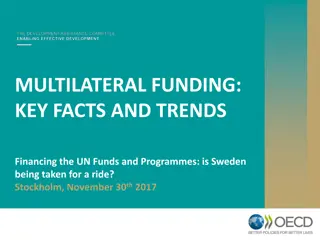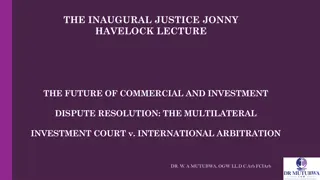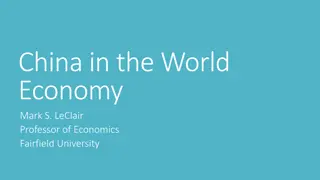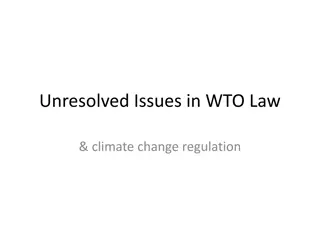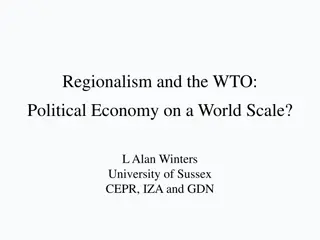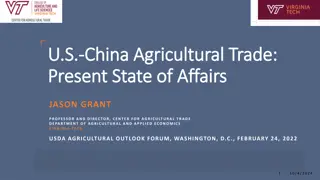Eco-Trade Policies at the WTO: Current Developments & Multilateral Interventions
Explore the evolution of eco-trade policies at the WTO, focusing on environmental sustainability initiatives, structured discussions, and the need for multilateral interventions to advance climate improvement goals. Learn about recent developments, negotiations, and the significance of multilateral cooperation in addressing global trade challenges.
Download Presentation

Please find below an Image/Link to download the presentation.
The content on the website is provided AS IS for your information and personal use only. It may not be sold, licensed, or shared on other websites without obtaining consent from the author.If you encounter any issues during the download, it is possible that the publisher has removed the file from their server.
You are allowed to download the files provided on this website for personal or commercial use, subject to the condition that they are used lawfully. All files are the property of their respective owners.
The content on the website is provided AS IS for your information and personal use only. It may not be sold, licensed, or shared on other websites without obtaining consent from the author.
E N D
Presentation Transcript
Turning over a New Leaf of International Trade: Eco-trade Policies at the WTO MICHELLE ZANG FACULTY OF LAW VICTORIA UNIVERSITY OF WELLINGTON
Concept: eco-trade policies Eco-trade policy: the trade policies/measures that are enforced with the primary aim of climate improvement Format Examples: Technical regulation or specifications: energy efficient/carbon consumption labelling Grants and direct payments: subsidies for renewable energy production Import charges: EU Carbon Border Adjustment Mechanism Import restrictive measures: EU Renewable Energy Directive (Palm oil) Mainly enforced domestically/unilaterally ; some through free (bilateral/regional) trade agreements
The current development at the WTO Structured Discussions: Trade and Environmental Sustainability (November 2020, 74 members) Informal Dialogue: Plastics pollution and environmentally sustainable plastics trade (November 2020, 75 members) to explore how the WTO could contribute to efforts to reduce plastics pollution and promote the transition to more environmentally sustainable trade in plastics; Initiative: The Fossil Fuel Subsidy Reform (December 2021, 47 members) coordinated by New Zealand; to rationalize and phase out inefficient fossil fuel subsidies The WTO Agreement on Fisheries Subsidies (June 2022) Eliminating subsidies contributing to harmful fisheries the first WTO agreement to place an environmental objective at its core
Question 1 do we still need multilateral intervention ? YES! to maximize the effectiveness, transparency, coherence, and equality To avoid free riding opportunity for protectionist measures, i.e. hidden trade restrictions EU Palm Oil dispute pending at the WTO Negotiation deadlock of Agreement on Climate Change, Trade and Sustainability (ACCTS)
Question 2 what type of multilateral intervention is needed? The current WTO setting: exception-based module Exceptions in public international law; WTO exceptions: public moral, health, environment . The insufficiency of exception model 1. normative hierarchy between trade and environment 2. indication of conflicts between trade and environment 3. chilling effects: legal uncertainties + heave burden of proof 4. chilling effects: reputation cost
The WTO approach towards Eco-trade policies: time for a change Ideal scenario/ long term solution: new multilateral rules at the WTO specific focus on the environment/climate emergency; enforceable rights and obligations on the states; reflect the mutual supportive relationship between trade and environment/climate protection Less ideal reality consensus-based decision-making process; unclear outcomes of the ongoing initiatives and discussions The need for short term solution: updated and environment-focused interpretation of critical WTO rules
Short term solution: updated interpretation of critical WTO rules Normative aim: eco-trade policy as an element of, rather than exception to, trade liberalization Step 1: avoid WTO violation through updated, environment-focused interpretation Step 2: interpreting/ re-interpreting WTO rules to make sure eco-trade policy is a legitimate action (no need for exception) Example: principle of non-discrimination and likeness typically, eco-trade policies impose varying treatments on products; EU Palm Oil
Challenges ahead Interpretation by judiciaries vs. deadlock of the WTO dispute settlement Disputes with needed factual setting Dedicate boundary lines between For eco-trade policy that is proportionately designed with solid scientific grounds, its compliance with WTO obligations should be warranted; Free riding phenomenon: to avoid disguised protectionist intention and excessive trade restrictiveness
